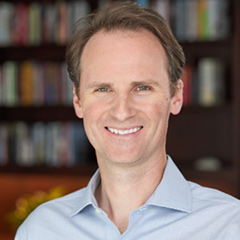MacArthur President John Palfrey shares our path to divest from fossil fuels and diversify our asset managers.
Climate change is likely the greatest existential threat to our planet and our collective well-being. With each major scientific report on climate change, the news is more worrisome, not less. Charitable foundations like ours must use all the tools at our disposal to ensure it does not get worse.
The climate crisis affects everyone in the world, but not equally. From wildfires that consume precious forests and rip through communities; to super-storms that inundate homes with floodwaters and ravage infrastructure; and water shortages and droughts that destroy crops and livelihoods—we see the ways in which some communities, many already marginalized, are suffering more from the ravages of climate change than others.
The MacArthur Foundation works to create a more just, verdant, and peaceful world. One of our Big Bets seeks to support Climate Solutions through a coordinated strategy of grantmaking and impact investments. In line with these goals, we are committing to greater alignment between our endowment investments and our programmatic goals, mission, and values. Today we share that we are on a path to divesting from fossil fuels.

Activists demand action on the global climate crisis.
Invest-Divest to Address Climate Change
As we begin to divest our investment assets from businesses in the fossil fuel industry, we are ramping up investments in companies and funds that seek to address climate change.
We have taken several steps toward divestment from fossil fuels to date. In late 2019, we ceased new investments in private funds that invest in oil and gas exploration. These funds are winding down over time, and we will continue our efforts to sell these privately-held assets in a manner consistent with our fiduciary duties.
Beginning this fall, we are changing the way we own equity exposure. We used to hold derivatives based on broad indices. Starting in the U.S. we will use an index that excludes companies with fossil fuel reserves. As these derivatives become practical to use globally, we will switch.
While we invest primarily through pooled funds, we also adopted a proxy policy several years ago. We communicate our preferences on proxies related to climate change and other subjects that link to our programs, so our managers can represent our values.
MacArthur, like many large foundations, has long maintained two methods for the use of investment assets with a commitment by our Board to review our approach periodically. Over the last eighteen months, our Board has reviewed our approach, consulted with a variety of professionals on how best to accomplish our goals, and commissioned a landscape analysis to understand better how other organizations are approaching the issues. We did this with an understanding that our strategic investment approach, which entails investing through pooled funds and the use of derivatives to obtain market “beta” exposure, has been very successful over long periods of time.
We believe that investing in climate-friendly solutions is as important as divesting from approaches that are harming the environment. Through our $500 million allocation to impact investments, we have been making important climate-related investments in funds such as Encourage Solar Finance, LP, which is accelerating the adoption of rooftop solar in India.
As such, we are committed to investing a larger percentage of our endowment and our impact investments portfolio in funds that focus on transitioning to cleaner energy and addressing the climate crisis. Taken together, these steps more closely align with the goals of our Climate Solutions grantmaking, which aims to reduce emissions worldwide and to address inequities in the ill effects of climate change.
Acknowledging Critiques, Being Accountable
We have in the past received criticism that our funding for climate solutions and some aspects of our investment portfolio have appeared to work at cross purposes. Our Board committed to continuing to review our approach periodically in light of changing circumstances, new knowledge, and emerging opportunities. Today, following the Board’s comprehensive review of our strategies, we take these next steps to align our investments with our goal to address the climate crisis while continuing our responsibility to steward our funds.
Foundations like MacArthur use massive tax-exempt wealth as the engine to provide grants for the public good. How we deploy our wealth through grants and impact investments makes a difference. How we invest and grow our endowment is important, too. I hasten to acknowledge there are some foundations and advocates who have been ahead of us and shown the way. To them, we express our appreciation for being pioneers and showing there can be a different approach than the ones that have brought us to this point. We will share our progress, to both hold ourselves accountable and to contribute to the chorus of voices showing there is a different way.
We continue to ask hard questions of ourselves about how we can do better over time to bring about the change we wish to see in the world. This process is not simple, especially when dealing with a multi-billion-dollar endowment that is invested in pooled funds with long-term commitments and with a goal of seeking the highest risk-adjusted returns. Those returns must fund a grants program with a long-term outlook. This is a process and not an end point, but our pathway is clear. I credit our Chief Investment Officer, Sue Manske, and her team of investment professionals for their work to adjust our portfolio in these important ways while ensuring we earn the returns to fund our grantmaking and impact investing programs.
Diversifying Our Money Managers
We also have more work to do in diversifying the managers who invest our endowment assets. Just as we seek to address the climate crisis, we seek to address historic and present-day inequities along the lines of race, ethnicity, disability, and gender, among other divides.
It is no secret that the money management and investment business has been dominated largely by firms led or owned by White men. Capable investment firms led by and/or owned by women and people of color have faced unequal challenges in attracting investment capital due to a variety of reasons, including discrimination, implicit bias, lack of opportunity for entry to the field, lack of mentorship, the amount of assets under management, and closed networks.
We determined several years ago that it was necessary for us to take additional steps to ensure that we are identifying and investing with more diverse firms. We reviewed our internal processes to ensure they were not constrained by implicit bias or our own experiences and preferences. We believe with the changes we have made, and continue to make, we can identify more investment firms led or owned by women and people of color. We continue to learn, too, through a partnership with Lenox Park and our colleagues at the Kresge Foundation.
We intend to be accountable and transparent on this front as well. We will report annually on our progress. While we recognize that there can be many reasons why assets under management can increase or decrease, our aspiration is to have at least 20 percent of our assets with U.S. based managers invested with firms led by managers of color and/or women by 2024. This is a near-term goal; we will continue to build from there. We hope this effort contributes to a more equitable investment field. To be clear, as we have diversified our investment managers in recent years, we have also continued to generate strong returns, and our return objectives remain the same.
Achieving Business Diversity
Finally, we want to give our own Staff the freedom to make investments in line with their values and consistent with our Just Imperative. This fall, our Staff will have expanded Environmental, Social, and Governance (ESG) investment options for their retirement savings plan. These fund choices will now also include diverse, best-in-class managers. A Staff committee has led this effort, mirroring our progress with our institutional investments. We urge all our fellow foundations to commit to a strategy of “business diversity,” a call to action by Ariel Investments CEO John Rogers that we, too, seek to heed. That means seeking out diverse partners among the law firms, accounting firms, marketing firms, and all those with whom we do business—as well as asset managers.
We remain a work in progress. We will continually search for approaches to achieve impact with our assets in ways that are consistent with our values and overall objectives as a mission-driven organization. In the process, I believe we will accomplish greater investment and social returns.




